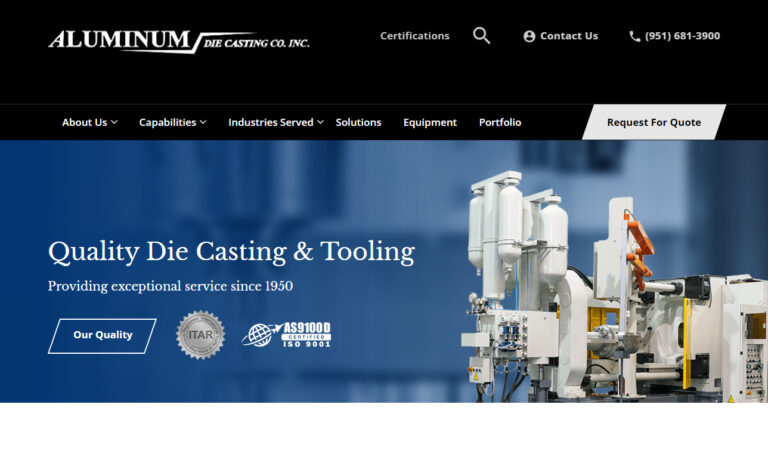About Aluminum Castings Company
The 6-Minute Rule for Aluminum Castings Company
Table of ContentsAluminum Castings Company Can Be Fun For EveryoneNot known Factual Statements About Aluminum Castings Company 3 Simple Techniques For Aluminum Castings CompanyThe Greatest Guide To Aluminum Castings CompanyThe 15-Second Trick For Aluminum Castings CompanyIndicators on Aluminum Castings Company You Should KnowWhat Does Aluminum Castings Company Mean?Not known Details About Aluminum Castings Company
There are two main kinds of die casting made use of in the light weight aluminum spreading market: hot chamber die casting and chilly chamber die casting. The main distinction between these methods is how the molten steel is provided to the mold and mildew. In warm chamber die casting, generally used for lower melting factor metals, the melting pot is straight attached to the maker, and a plunger compels the material via a gooseneck right into the die cavity.
A Biased View of Aluminum Castings Company
In these approaches, the mold is purposefully destroyed or escaped in order to draw out the completed light weight aluminum spreading. Usual procedures under the classification of expendable mold and mildew casting include (investment casting),,, and investment casting. When making custom-made light weight aluminum parts using expendable mold and mildews, makers put molten aluminum or aluminum alloys right into the mold, which is then broken apart to launch the solidified steel part.
The is just one of the earliest and most utilized kinds of light weight aluminum spreading. It entails compacting specialty shop sand, usually strengthened with clay or material, around a specifically crafted reusable pattern that determines the shape and inner information of the ended up light weight aluminum product. The pattern system integrates risers and vents to take care of the flow of molten metal and to prevent casting defects such as contraction porosity.
The Basic Principles Of Aluminum Castings Company

This mold and mildew is then preheated before the putting of liquified aluminum or aluminum alloy. As the metal fills the shell, it captures the detailed information and fine surface coating of the mold and mildew. Once cooled, the ceramic is mechanically or chemically escaped, permitting the removal and separation of individual actors parts.
Fascination About Aluminum Castings Company
Long-term mold and mildew casting makes use of multiple-use metal mold and mildews and is optimal for automation with consistent high quality and less waste. Expendable mold and mildew casting makes use of single-use molds, like sand or foam, providing layout flexibility and lower tooling prices for prototypes or short runs. Die casting is best for creating high quantities of light weight aluminum components that need limited tolerances, great information, and smooth surfaces.
The Toshiba Maker DC-J Collection consists of die casting equipments ideal for aluminum. Understood for their durable building and construction and high shot performance, these machines ensure reliable and exact spreading (Sand Molding).

While light weight aluminum can be utilized in its pure form, it is usually alloyed with various other metals to enhance its residential properties or the residential or commercial properties of the various other metals. These alloys use enhanced performance for different applications. Aluminum alloys are categorized right into eight collection, numbered from one to eight. The first figure(s) of the number suggest the main alloying element combined with light weight aluminum.
Everything about Aluminum Castings Company
This alloying enhances the toughness and firmness of aluminum however reduces its ductility and deterioration resistance. The 2000 collection alloys are challenging to weld yet can be warmth dealt with to boost their properties. The 3000 series alloys are primarily alloyed with manganese. This combination boosts deterioration resistance while providing moderate toughness.
In addition, it features high ductility and a very smooth ended up surface area. The 4000 series alloys are alloyed with silicon, which lowers the melting factor and boosts fluidity. This makes it a preferred selection for spreading, as it is simple to develop in its molten state. The 4000 series is also frequently made use of as a filler for welding and brazing applications.
The Main Principles Of Aluminum Castings Company
This series is identified as a high-strength alloy, particularly fit for sheet and plate applications due to its excellent weldability. Its resistance to deterioration from acids and antacid makes it optimal for usage in harsh and hostile environments (Sand Mold). The 6000 collection alloys are alloyed with both magnesium and silicon, offering a balance of strength, mechanical residential properties, and deterioration resistance
Handling the 6000 collection calls for specialized and sophisticated tools, which can be complex and pricey. This series is understood for its excellent rust and oxidation resistance, as well as its simplicity of layer, treatment, and workability. The 7000 series light weight aluminum alloys are the strongest and most resilient among light weight aluminum types, with strength comparable to around two-thirds of industrial-grade A3 steel.
9 Simple Techniques For Aluminum Castings Company
Zinc is the primary alloying aspect in the 7000 series, boosting the solidity of the light weight aluminum, although zinc's firmness resembles that of aluminum on the Mohs range. The 8000 series aluminum alloys are primarily alloyed with tin, along with percentages of copper and nickel (Aluminum Castings). While these alloys provide lower strength compared to various other series, they master machinability and use resistance
Aluminum cast heatsinks are electrically conductive, permitting them to be based effectively. They are often cast with incorporated attributes that minimize the demand for second operations, such as added machining or setting up, causing further price financial savings. Light weight aluminum spreading is frequently utilized to manufacture brackets for both durable commercial tools and family appliances.
Not known Factual Statements About Aluminum Castings Company
The single-piece construction of aluminum try these out braces improves their toughness and resilience, minimizing the likelihood of failing. If holes are called for, they can be included straight in the spreading mold, minimizing the requirement for post-production completing (https://www.cybo.com/US-biz/aluminum-castings-corporation_2k#google_vignette). Producers have progressively adopted aluminum spreading for golf tools because of its longevity, security, and adaptability in shaping